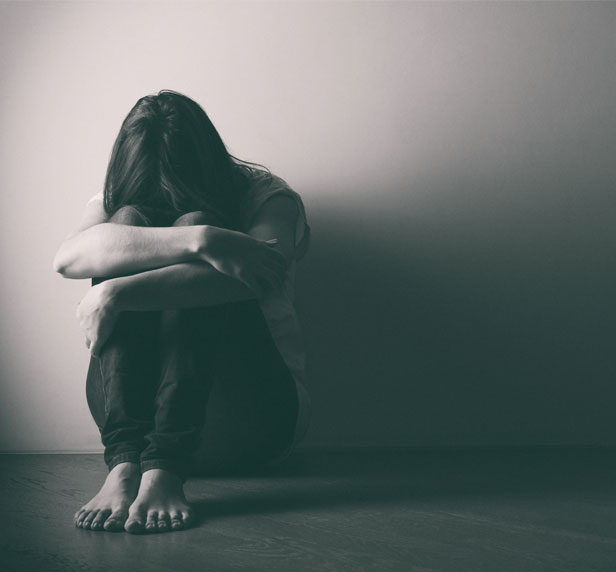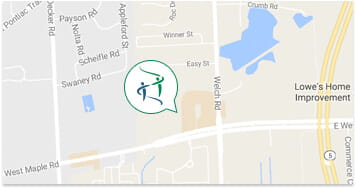
Find a Therapist for Depression at Viewpoint Psychology
Treating patients in Commerce & West Bloomfield, Michigan
Depression's grip can be subtle. You might feel like a stranger in your own body, a muted version of your usual self. While you might not notice the shift, loved ones often pick up on changes in your mood or behavior. And unlike anxiety, where physical symptoms like a racing heart or shortness of breath can be scary and hard to ignore, depression can be sneakier.
It can make it easy to fall into a pattern of low motivation, where even getting out of bed feels like a huge effort. And when happiness seems like a distant memory, it's tough to find the energy to change things.
Imagine feeling like you're stuck in a thick fog, unable to see the light. That's what depression can feel like. It can cloud your thoughts and make everything seem negative: yourself, the people around you, and the world in general. This negativity can become a cycle, leading to unhealthy habits that make you feel even worse.
In severe cases, depression can even lead to thoughts of suicide. If you're struggling with these thoughts, please know that help is available, and you don't have to go through this alone. Through counseling for depression, Viewpoint Psychology is here to support you on your journey to feeling better. We can help you understand the disorder, develop healthy coping skills, and rediscover the joy in life.

Major Depressive Disorder (MDD)
Major Depressive Disorder (MDD) is a real medical condition that can make everyday life feel incredibly difficult. While there are different levels of severity, the core symptoms can leave you feeling drained and unmotivated. Here are some of the common signs:
- Feeling down or depressed most of the day: It's normal to have bad days, but with MDD, this sadness feels deeper and more persistent.
- Changes in sleep or appetite: You might struggle to fall asleep or find yourself sleeping all the time. Similarly, your appetite might disappear or you might crave unhealthy foods.
- Increased irritability or anger: Even small things can feel overwhelming and lead to outbursts.
- Pulling away from loved ones: Socializing can seem exhausting, and you might isolate yourself from the people who care about you.
- Losing interest in hobbies: Activities you used to enjoy no longer bring you pleasure.
- Feelings of hopelessness and worthlessness: You might feel like things will never get better and you're a burden to others.
- Thoughts of suicide: If you're having thoughts of harming yourself, please know that help is available. You don't have to go through this alone.

Dysthymia
Life can feel heavy sometimes, and if you're constantly battling a low mood, you might be wondering what's going on. There are two main types of depression: Major Depressive Disorder (MDD) and Dysthymia.
MDD can hit you like a wave, bringing intense sadness and impacting your daily life. Dysthymia, on the other hand, is more like a persistent undercurrent. It might feel like a general lack of enthusiasm or a low hum of sadness that lingers for at least two years. While the symptoms of both conditions can be similar, such as changes in sleep or appetite, low energy, and difficulty concentrating, Dysthymia tends to be less severe but much more long-lasting.
If you find yourself struggling with these symptoms, remember you're not alone. Viewpoint Psychology can help you develop coping mechanisms and find ways to feel better with the help of a depression therapist. Don't hesitate to reach out for support.

Disruptive Mood Dysregulation Disorder (DMDD)
Sometimes emotions feel like a runaway train, especially for kids. Disruptive Mood Dysregulation Disorder (DMDD) isn't quite a depression, although feeling down can be a part of it. The key feature of DMDD is intense irritability and anger. Imagine frequent outbursts, both with words and actions, happening at least three times a week for a whole year. Kids with DMDD also feel cranky or angry most of the time. This can make things tough at home, school, and with friends.
The important thing to know is that DMDD is a treatable condition, but it can only be diagnosed in children and teenagers. Contact Viewpoint Psychology today to find a therapist for teenage depression.

Premenstrual Dysphoric Disorder (PMDD)
Many women experience pre-menstrual symptoms like bloating or cramps. But for some, these symptoms become much more intense, affecting their daily lives. This is Premenstrual Dysphoric Disorder (PMDD), a condition that can cause significant mood swings, irritability, and anxiety in a week or two leading up to your period.
Think of it like this: PMS is like a light drizzle, annoying but manageable. PMDD, however, is a downpour that disrupts your entire routine. Symptoms can include:
- Mood swings, irritability, and anger
- Increased depression and anxiety
- Trouble focusing and completing tasks
- Loss of interest in hobbies
- Changes in appetite and sleep
- Feeling overwhelmed and out of control
If you recognize yourself in this description, there's help available. Viewpoint Psychology's depression therapy for women can help you manage your symptoms and find ways to feel better throughout your cycle. You don't have to weather this storm alone.

Bipolar I and II
Bipolar disorder, formerly called manic-depressive illness, is a mental health condition that causes extreme mood swings. A diagnosis requires experiencing either a manic episode or a hypomanic episode, along with a depressive episode at some point.
Bipolar I vs. Bipolar II: Decoding the Mood Extremes
The key difference between Bipolar I and Bipolar II lies in the severity of the manic episodes.
- Bipolar I: Here, a manic episode lasts for at least one week, significantly impacting daily life. Symptoms include abnormally elevated or irritable mood, increased energy, racing thoughts, inflated self-esteem, and engaging in risky behavior.
- Bipolar II: Individuals with Bipolar II experience hypomanic episodes, which are less severe and shorter (lasting at least four days) than manic episodes. While they might exhibit similar symptoms like increased energy, talkativeness, and racing thoughts, these episodes don't disrupt daily functioning as severely as manic episodes.
Finding Support for Bipolar Disorder
Bipolar disorder is treatable. If you suspect you or someone you know might be experiencing bipolar symptoms, reach out for professional help. Viewpoint Psychology can assist you in managing your moods and finding a path to stability and well-being. Contact us today to learn more and ask us about cognitive behavioral therapy for depression.

Questions About Insurance?
Your financial situation shouldn't be a barrier to living a happier life. We accept a wide range of insurance plans and offer sliding scale rates to make sure you receive the treatment you need.
View Payment Options
Therapy for Depression in Commerce & West Bloomfield
Don't let depression dim your light. You're not alone in feeling down, unmotivated, or stuck in a fog. While depression can feel heavy, there is hope. Viewpoint Psychology helps people overcome depression and rediscover joy in life.
Our certified therapists can help you understand depression and its impact, develop healthy coping mechanisms, break free from negative thoughts, improve mood and energy levels, build stronger relationships, and find renewed purpose and enjoyment.
Contact Viewpoint Psychology to schedule a consultation, or call us today at (248) 669-9500 to start investing in your emotional well-being today.
Contact Us


